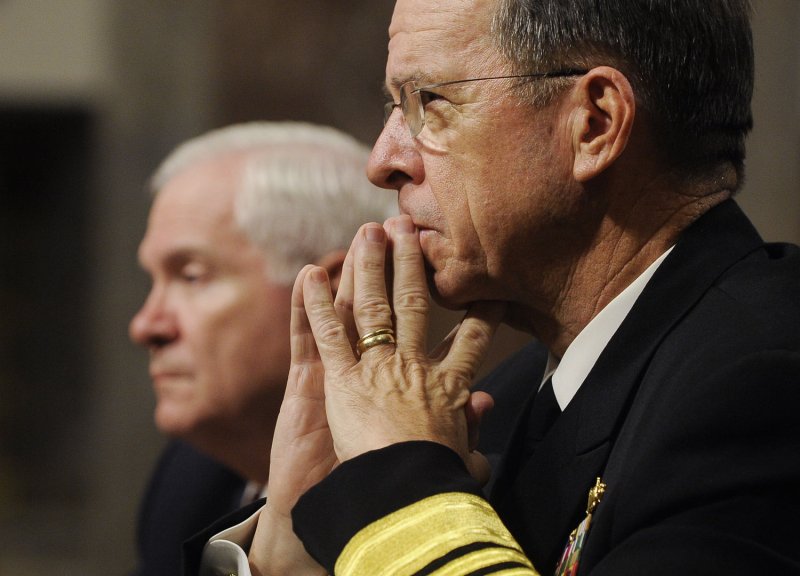Defense Secretary Robert Gates and Chairman of the Joint Chiefs of Staff Adm. Michael Mullen testify before the Senate Armed Services Committee regarding U.S. military involvement in Libya on Capitol Hill in Washington on March 31, 2011. UPI/Roger L. Wollenberg |
License Photo
WASHINGTON, March 31 (UPI) -- U.S. lawmakers questioned top defense officials about military efforts in Libya for the first time Thursday, expressing bipartisan concern about the role and clarity of the U.S. involvement and the composition and strength of forces opposing Libyan leader Moammar Gadhafi.
U.S. Secretary of Defense Robert Gates and Chairman of the Joint Chiefs U.S. Navy Adm. Mike Mullen faced fierce questioning from both the Senate and House of Representatives Armed Services Committees. Both officials assured congressional leaders that no U.S. troops would be sent into Libya even in the event of a NATO ground offensive.
Despite those assurances, members of Congress remained skeptical about the length and amount of U.S. involvement.
House Republicans offered the most critical comments. When Gates said the goal in Libya was humanitarian aid, U.S. Rep. Mike Coffman, R-Colo., said President Barack Obama wasn't telling the whole truth.
"Of course this is regime change," Coffman said. "Why not be honest with the American people?"
In his remarks to both committees, Gates said destroying Gadhafi's military capabilities, not deposing the Libyan leader, is the military and humanitarian mission.
"It's trying to prevent these people from being killed by their own government in large numbers and destabilizing the region," Gates said.
"In my view, the removal of Col. Gadhafi will likely be achieved over time through political and economic measures and by his own people."
U.S. Sen. John McCain, R-Ariz., took a different approach, warning that U.S. de-escalation in Libya could spell more trouble than good. McCain argued the U.S. military and political objective is to remove Gadhafi and U.S. forces need to remain on the offensive to accomplish that.
"If Gadhafi remains in power, wounded and angry, he will only be more of a threat to the world," McCain said.
McCain pointed to the recent retreat and defeat of opposition forces at Misrata to illustrate the weakness of opposition forces. Gates and Mullen acknowledged the rebel forces are small, around 1,000 military trained rebels in the east and, Gates said, knowledge like biographical information is available for just "a handful" of fighters.
Gates said even calling them the opposition is a misnomer, describing rebels as disparate and disaggregated.
Furthermore, Gates said arming rebel forces is a continued option and something that U.S. or allied forces can accomplish. But the rebels have yet to ask for assistance.
"Obviously the upside is providing them with more sophisticated weapons might allow them to be more successful but frankly I don't believe that is the primary objective right now," Gates said.
Both senators and representatives seemed skeptical of the rebels' ability to combat Gadhafi's forces in the long term.
"They seem to be getting their butts whipped," Rep. Jeff Miller, R-Fla., said. Gates said that weather has prevented U.S. and NATO planes from being as effective in deterring Gadhafi, allowing him the large gains seen in the last few days.
The Senate committee had a decidedly more hawkish tone, with McCain and Sen. Lindsey Graham, R-S.C., advocating greater action.
Graham asked, "Who would be mad at us if we dropped a bomb on Gadhafi and why would they be mad?"
Gates noted that President Ronald Reagan attempted that. Graham then abruptly left the hearing.
Gates said NATO forces took operational control Thursday morning, ending nearly three weeks of a coalition led by U.S., European, and Arab forces. Reflecting the change in leadership, the former Operation Odyssey Dawn has been renamed Operation Unified Protector.
Mullen said that U.S. and coalition bombing has reduced Gadhafi's military capacity by 20 to 25 percent, including almost eliminating Gadhafi's air power and air defenses.
"That doesn't mean he's about to break from a military standpoint because that simply is not the case," Mullen said, adding that Gadhafi's military strength is still superior to that of the rebels.
Mullen estimated that Canadian Lt. Gen. Charles Bouchard, now in charge of the NATO operation, has 25 ships and 220 aircraft at his disposal. Mullen stressed that military support has come from Arab nations such as Qatar and the United Arab Emirates as well.
The hearing occurred in the midst of ongoing budget crisis and costs factored into congressional questioning. Gates said the United States had spent an estimated $550 million through Monday and an ongoing supporting role in Libya would cost $40 million a month.
He said any pending government shutdown wouldn't affect U.S. military missions in Iraq, Afghanistan or Libya and stressed resources wouldn't be diverted from Afghanistan.
When asked about reports that U.S. intelligence agents are operating inside Libya, Gates said he couldn't comment on CIA activities.
Despite the mission's uncertainty, Mullen said he couldn't recall another instance of a strong diverse, international coalition forming so quickly and he said it was imperative.
"The enemy wasn't just Gadhafi's military, it was the clock as he marched on Benghazi," he said.





